By Vasilis Vasilas.
2020 marks eighty years since Greece’s Prime Minister Ioannis Metaxas’ famous declaration, ‘OXI’ (NO!) to Italy’s proposed annexation, subsequently triggering an Italian invasion. While Greece’s glorious military feats against the Italians have been well-documented, whether through historical recount or analysis in so many mediums over the many decades, looking at the events through a newspaper of the Greek diaspora, such as the Panellinios Kiryx, highlights its significant role in providing news information to its readership on the other side of the world, as well as bridging the relationship between Australia’s Greek migrant communities with the broader Australian society.
As the Panellinios Kiryx’s policy at the time, stated in its masthead, was to ‘promote friendly relations between the Greek and Australian people and to educate and instruct Greeks in Australian sentiment and develop good citizenship,’ how was Italy’s declaration of war against Greece and the ensuing Greek-Italian campaign presented in Sydney’s Panellinios Kiryx? While its readership’s homeland was at war, in what ways did the newspaper promote friendly relations between Greeks and Australians, and how did it develop good citizenship among Australia’s Greeks?
Before we examine the significant coverage of October 28, 1940, the Panellinios Kiryx was already covering the prelude to the forthcoming events with the sinking of the Greek cruiser, ‘Elli,’ docked at the island of Tinos as it was participating in the Feast of the Dormition of the Theotokos (Panellinios Kiryx, August 22, 1940), with the front page headline capturing the plight in Greek Italian relations, ‘Greece Is Determined to Protect its Liberty at all Costs’, while stating the torpedo that sunk ‘Elli’ was Italian. Furthermore, the Panellinios Kiryx’s editorial, written in English, ‘Italian Double Dealing and Double Crossing’ (October 17, 1940) puts forth the Greek case of not trusting Italy’s assurances that it respects Greece’s sovereignty – colourfully portraying Italian policies as ‘Caponism’ and ‘Mafiasm,’ and foreshadowing the imminence of an Italian defeat, ‘And Italy is rushing headlong toward that inglorious destiny.’
Rallying Behind OXI:
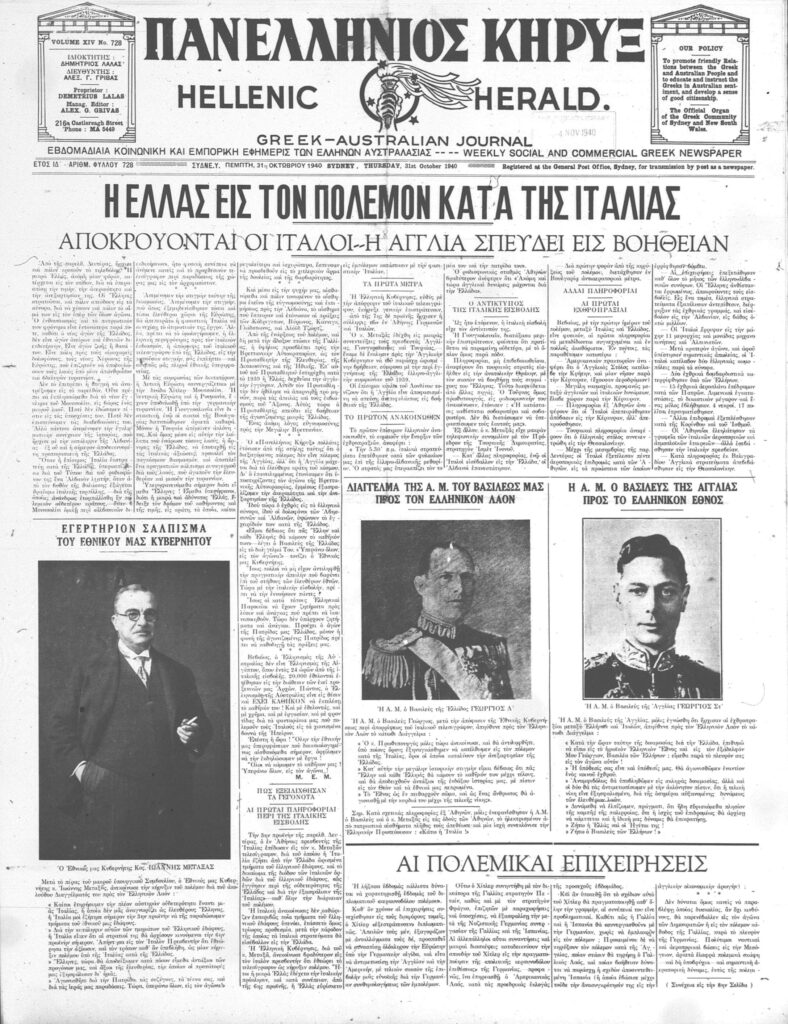
As Panellinios Kiryx was a weekly newspaper, published on Thursdays, the news of Italy’s declaration of war against Greece was published on October 31. As a broadsheet newspaper, the entire front page was dedicated to the headline, ‘Hellas at War with Italy.’ Throughout the main article, Greece is repeatedly referred to as a ‘small’ country, and protecting its sovereignty and freedom against a much larger, aggressive country. There are proud, patriotic statements such as ‘Today, we are proud to be Greek. We are proud because a small and weak Greece showed the road of duty and honour to countries which are larger and more powerful but hurriedly tied themselves to the Hitler’s chariot of slavery and brutality,’ and ‘… as Greece’s new struggle is not a struggle of dreams and national claims. It is a struggle of life and death.’
Included on the front page are also portraits and statements from Greece’s Prime Minister, Ioannis Metaxas and King George I, as well Great Britain’s King, George VI. Both Metaxas and King George I rally the Greek people with a reference to history, with the former stating, ‘Greeks, now we will show just how worthy we are to our ancestors which our forefathers secured for us,’ and the latter, ‘And at this great historical moment I am sure every Greek will do their duty until the end and we will prove worthy of glorious history, with our faith in God and our national destiny.’ Great Britain’s King George VI immediately provides assurances of his country’s support for the Greek struggle, ‘In this testing hour for Greece, I wish to say to the heroic Greek nation and to my cousin, King George of Hellenes: I am at your side during this fight! Your matters are our matters. We will fight against the common foe.’
Week after Week, Victory after Victory:
With the Greek army quickly halting the Italian advance and the commencement of their counter-offensive, then pushing the Italian army into Albania and, in turn, liberating towns and villages of northern Epirus, this series of Greek victories were vividly captured by Panellinios Kiryx. As a weekly paper, the headlines of victory and anticipated advances would have captivated its readership and prompted such a great sense of national pride.
Only one week after the Italian invasion, any Italian dream of ‘Athens by Christmas’ was shattered by the rallying Greek army and the headline, ‘Greeks Stop the Italian advance’ and sub-headline, ‘Greeks Threaten Koritsa; English at Crete’ highlight the complete and rapid changing fortunes in the campaign. How the Panellinios Kiryx structures the front pages is as a general news article and then provides readers with a day-to-day account of events. Again, the establishing sentence emphasises the David and Goliath contest as ‘It has been one week from the commencement of the war between the barbaric Fascist Italy and the small and weak Greece,’ but the driving force behind the latter’s efforts become profoundly clear, ‘… a race who’s foremost characteristic is its great love for liberty.’ (Panellinios Kiryx, November 7, 1940) As a historical source, what signifies the Panellinios Kiryx’s coverage of the Greek-Italian campaign is also visual stimuli accompanying the text, with a photograph of Greek soldiers passing a bomb shelter.
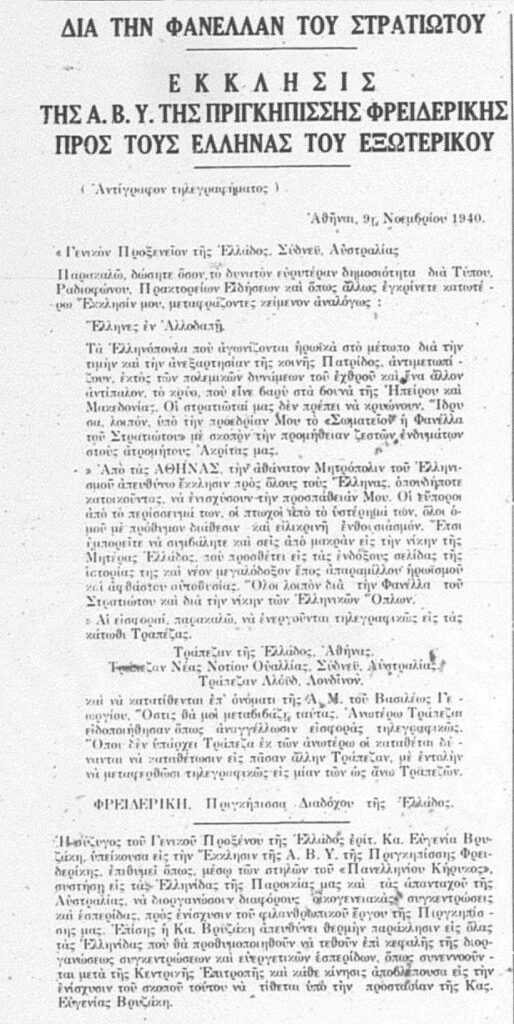
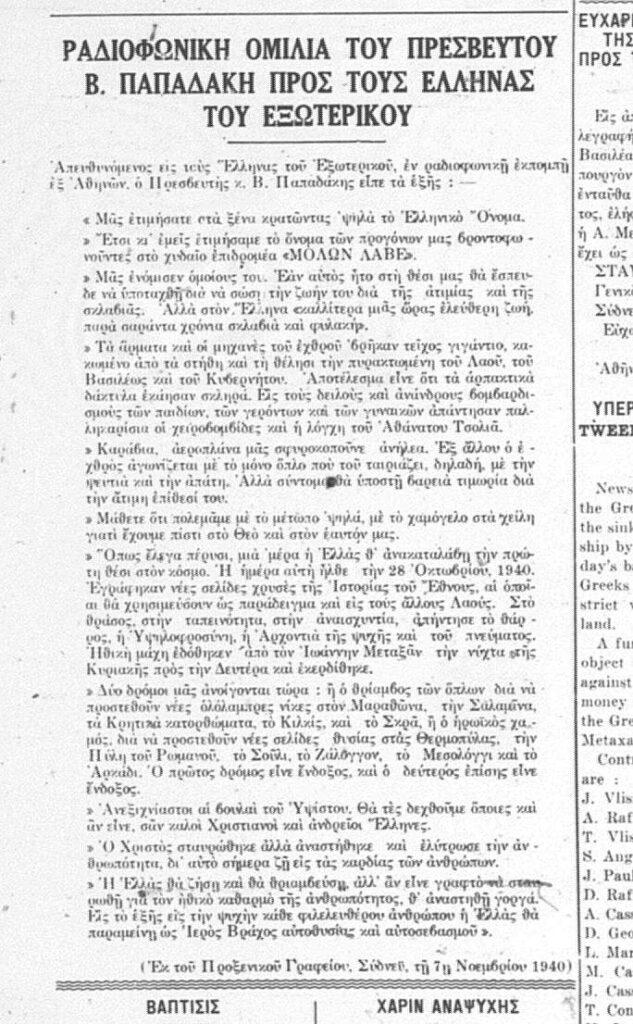
Despite the Greek armies halting of the Italian advance, the ‘against the odds’ image persists, ‘For one more week of epic resistance from the small but heroic Greece against the ever-strong Italy,’ and the Greek army’s resistance is generating an enormous sense of pride, ‘One more week that has strengthened our patriotism and national pride with a new golden page being written by our brave men in the mountains of Epirus and Macedonia.’ (November 14, 1940)
By the November 21, 1940, edition of the newspaper, the headline read, ‘The Greeks Advance in Albania’ and the victorious Greek army’s feats were announced in the November 28, 1940, edition, ‘Ever Bright Victory of the Greek Army’ as the towns Koritsa and Argyrokastro in northern Epirus had been liberated. December editions continued to follow the Greek army’s advancements; every victory provided Greek readers and Australians a growing swell of pride and admiration, as the English editorial read, ‘The slogan for the Greek from time immemorial has been, DEATH BEFORE SURRENDER’ (Panellinios Kiryx, December 12, 1940) As the Greek army’s advance continued, the headlines continued, ‘The Greeks At Tepeleni and Cheimara.’ (Panellinios Kiryx, December 12, 1940) Despite the challenges of limitations in the weaponry and ill-organised supply lines, the Greek army had achieved the unbelievable by advancing deeper into Albania.
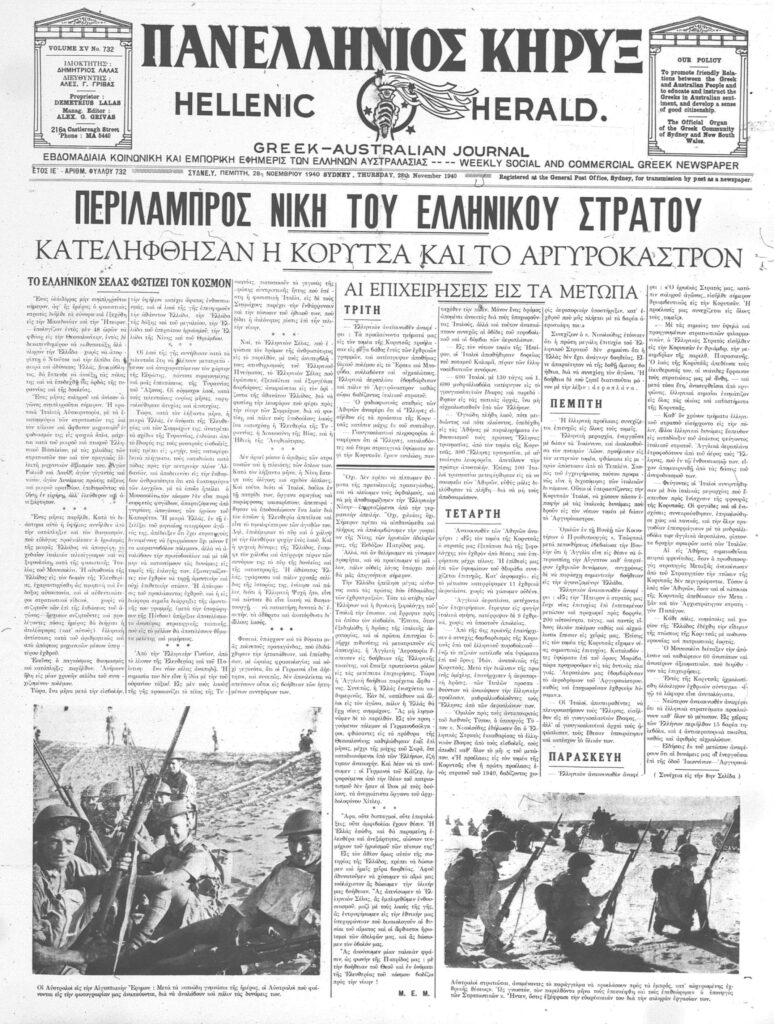
With the New Year came news of more victories, as Cheimara fell (Panellinios Kiryx, January 2, 1941) and, after a thirty-one minute battle, Kleisoura was taken, (Panellinios Kiryx, January 16, 1941), while Italy’s counteroffensive was quelled (Panellinios Kiryx, January 31, 1941)
As an aside, astrologer A.J. Bush examined the alignment of the planets to provide a forecast for the Greek armed forces. For example, one of the predictions was, ‘The New Moon for the 27th March shows the distinct possibility again of universal public rejoicing throughout the country, and I notice here a strong indication of new Allies and or substantial help which will greatly increase the power of the fighting forces’ (Panellinios Kiryx, January 16, 1941). How prophetic Bush was, when we consider the Greek nation would have been celebrating around March 25, with Independence Day celebrations, and the British army was already in Crete at the time.
After months of headlines highlighting the Greek army’s glorious victories and advancement, news of Prime Minister Ioannis Metaxas’ unexpected death was captured by the Panellinios Kiryx’s sketch of his portrait amongst marching evzones- with the caption, ‘The sacred memory of Ioannis Metaxas who always guided to victories and triumphs’ (February January 16, 1941). As the Greek Consul, Dr E. Vrizakis, paid tribute to the late Prime Minister on 2BL, ‘I feel that Metaxas had sown the good seed and that Greece, before long, will reap a rich harvest of moral and material wealth,’ it was as though his death inspired further victories- with the liberation of Kleisoura and the Greek army capturing thousands of Italian prisoners.

The enormous outpouring of support on the Australian home front:
Greece’s heroic defence evidently captured the admiration of nations across the globe, including Australia, and the support was immediate. With the Greek Consul General, Emilios Vrizakis, establishing the Greek War Fund, where people could make a donation towards Greece’s war efforts, the rush to financially support the Greek cause was incredible. In only a week, Australia’s Greek communities had donated £1328-9-0 with Port Pirie’s Greek community raising another £600, Innisfail’s Castellorizians donating £100 and Sydney and NSW’s Cypriots raising £50!
And the donations poured in from Australians too: the fish agent, Arthur Murrell donated £600; through the Central Committee members, S. Andronikos and A Diamantopouos, they received £237 from Australians; the company Nathan and Wyeth, who imported Varvaressos Ouzo, donated £10. And the support did not only come in money; the company, Henry Woolf Butchers, donated five tonnes of meat for Greece’s war effort! The Greek victories also captivated the local Australian newspapers; via the ‘The Tweed Daily,’ the Greeks of Murwillumbah raised £78. 11.0! With Queen Frederika addressing the Greek diaspora, the initiative, ‘The Jumper of the Soldier,’ was launched, which was known in Australia as the Ladies Greek Auxiliary Comforts Fund! (Panellinios Kiryx, November 14, 1940)
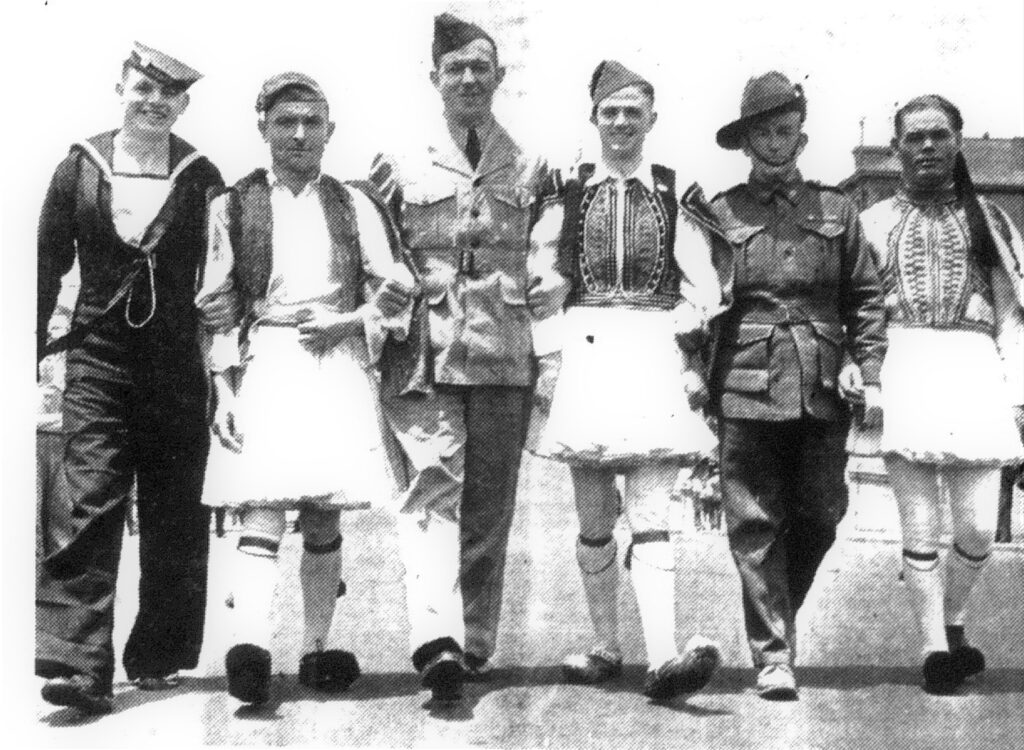
As the Greek War Relief Fund declared, ‘Act on our Sacred Duty to our Homeland, Greece,’ another list of individualised contributions was published with subgroups of Sydney and suburbs, Silkwood (Queensland), Cooma and Goulburn (NSW) and Mt Larcoum (Queensland), all raising £794.14.0. As the Kytherian Brotherhood announced they would be making a substantial donation, Sydney Castellorizians also donated £200 in this latest wave of donations. (Panellinios Kiryx, November 28, 1940).
And the wave of support gathered momentum, as the whole country was behind Greece. Within the week, another £3, 073.3.4 was raised- including donations from NSW country towns such as Katoomba, Molong, West Wyalong, Queenbeyan, Narromine, Cowra, Barraba, Temora, Dubbo and Trangie, as well as Ipswich (Queensland). Included was the donation of £100 from the Chelmos Association. The list of contributors was so large that it went over a second page (December 5, 1940).
Within another week, the monies raised were at £9515.0.1 (Panellinios Kiryx, December 26, 1940) and another week, it had jumped to £12, 575.0.10 (Panellinios Kiryx, January 2, 1941). Every week, the updated amount surged by the thousands. Fundraising for the Greek War Relief Fund just did not cease. In fact, great sums continued to be raised. One example is the Chelmos Association whose funds increased from its initial £422.16.056 to £1003.1.7! Every social dance within the Greek communities across the country, even theatre performances, was dedicated to raising monies for the Greek War Relief Fund.
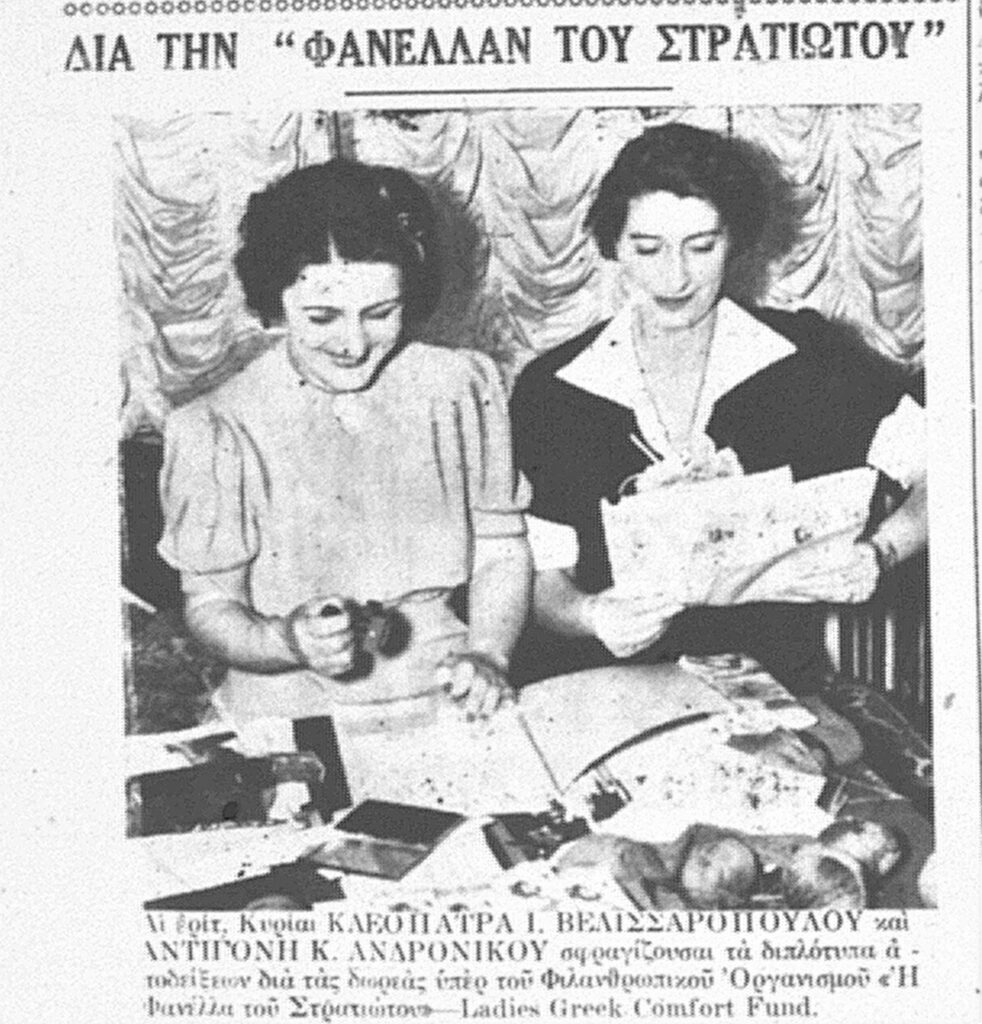
Examining the list of contributors of the Ladies Greek Auxiliary Comfort Fund, which raised £179-14-8, it is admirable to notice just how many non-Greek ladies were contributors (Panellinios Kiryx, January 23, 1941). It should be highlighted that the whole nation came to the support of the Greek cause and this is epitomised by the Lord Mayor of Brisbane, Rt. Hon. J. B. Chandler’s radio appeal, where he appealed for Australians to get behind the fund-raising efforts for the Greek army, ‘The maintenance of the Greek army and the Greek people is a vital necessity to our own national existence…I again appeal to you to give- give freely- give liberally- give NOW!’ (Panellinios Kiryx, February 13, 1941).
The Greek Italian War truly captivated Australians. At this point, only Greece was defying the Axis Powers push across Europe. So much was the enthusiasm and admiration for Greece’s victories- as well as the understanding for the Greek army and nation to be financially supported- that Friday February 28, 1941 was declared Greek Day as an opportunity to celebrate Greece’s victories and raise more funds. All the celebrations culminated with a parade of Greeks dressed as evzones and Australians! Panellinios Kiryx’s editor, A. G. Grivas, wrote, ‘APPRECIATION. To the excellent organisers of the magnificent celebrations of Australia’s Greek Day, to the most generous Australian People who with traditional nobility of their hearts spontaneously responded to the appeal for the valiant Greece Forces, the Greek Community of Sydney has no adequate words to express its appreciation. From the innermost of their hearts, the Greeks of Australia extend to every one of them their sincere thanks…’ (March 6, 1941) What these Greek Day celebrations pointed out to Australians was what an important ally Greece was to the Allied cause. It also provided Australians with an insight of Greece and the Greek people, as ANZACS and British forces would soon be deployed in Greece to defend the country against Germany’s inevitable invasion.
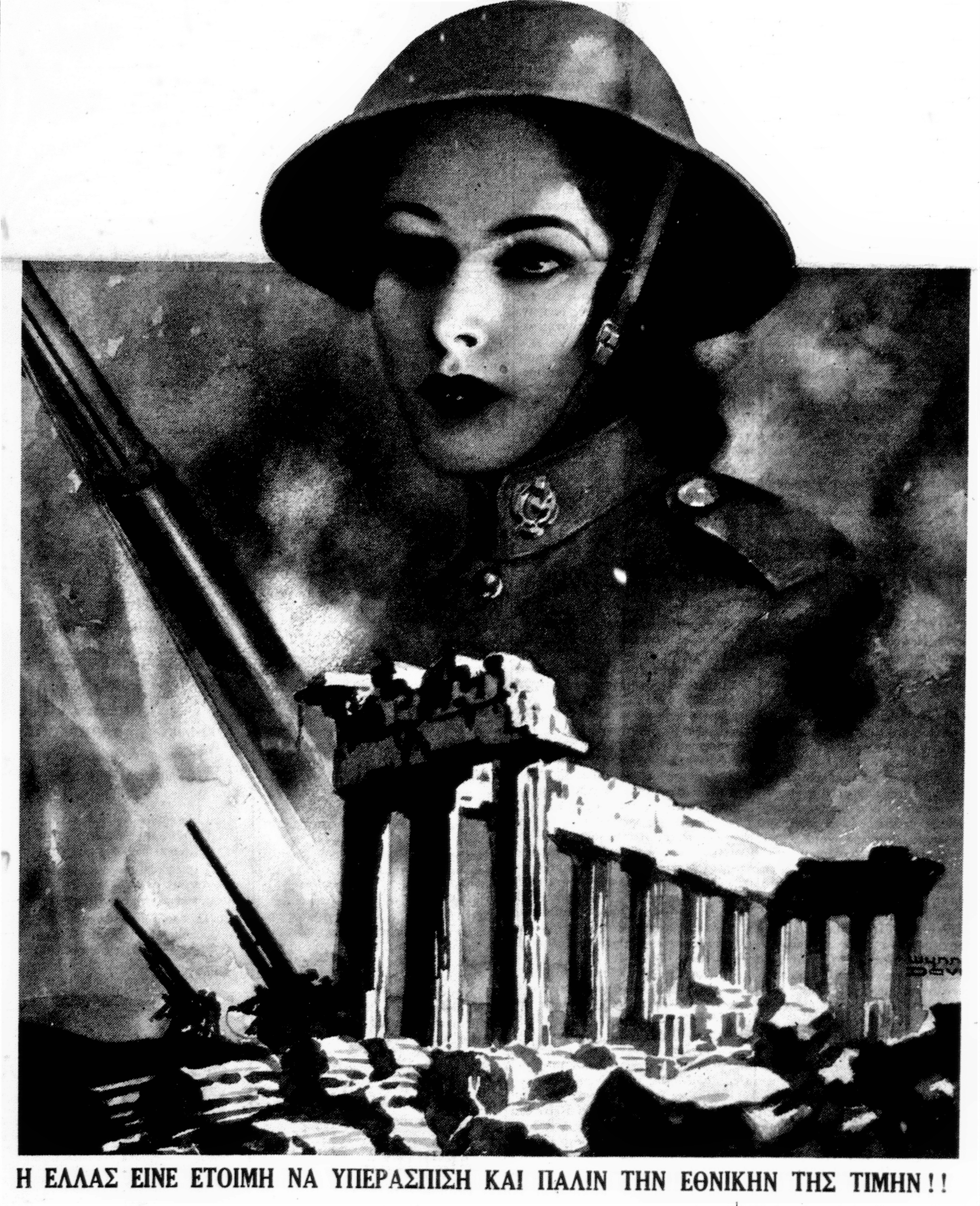
Greece’s delays in entering World War I placed pressure on Australia’s Greek communities and generated a poor portrayal of their homeland. World War II, however, was a profoundly different experience for Greece as Italy’s expansionist policies thrust it into war. Whether it was Australians’ love for the ‘underdog’ – with Greece defying all odds against a strong, aggressive Italy- or Greece proving to be an important ally for the free world, Australians were presented with a great image of Greece and its people, who showed enormous courage against all adversities to repel the Italian invasion and then advance deep into Albanian territory.
And the Panellinios Kiryx played an instrumental role in the re-evaluation of the Greek image in Australia. Whether it was its weekly updated funds of the Greek War Relief Fund or several editorials written in English, the newspaper went beyond its role in informing its Greek readership by bringing Greeks and Australians closer in the Allied cause. And the ANZACs defending Greece against the German invasion would merely solidify this relationship forever.
